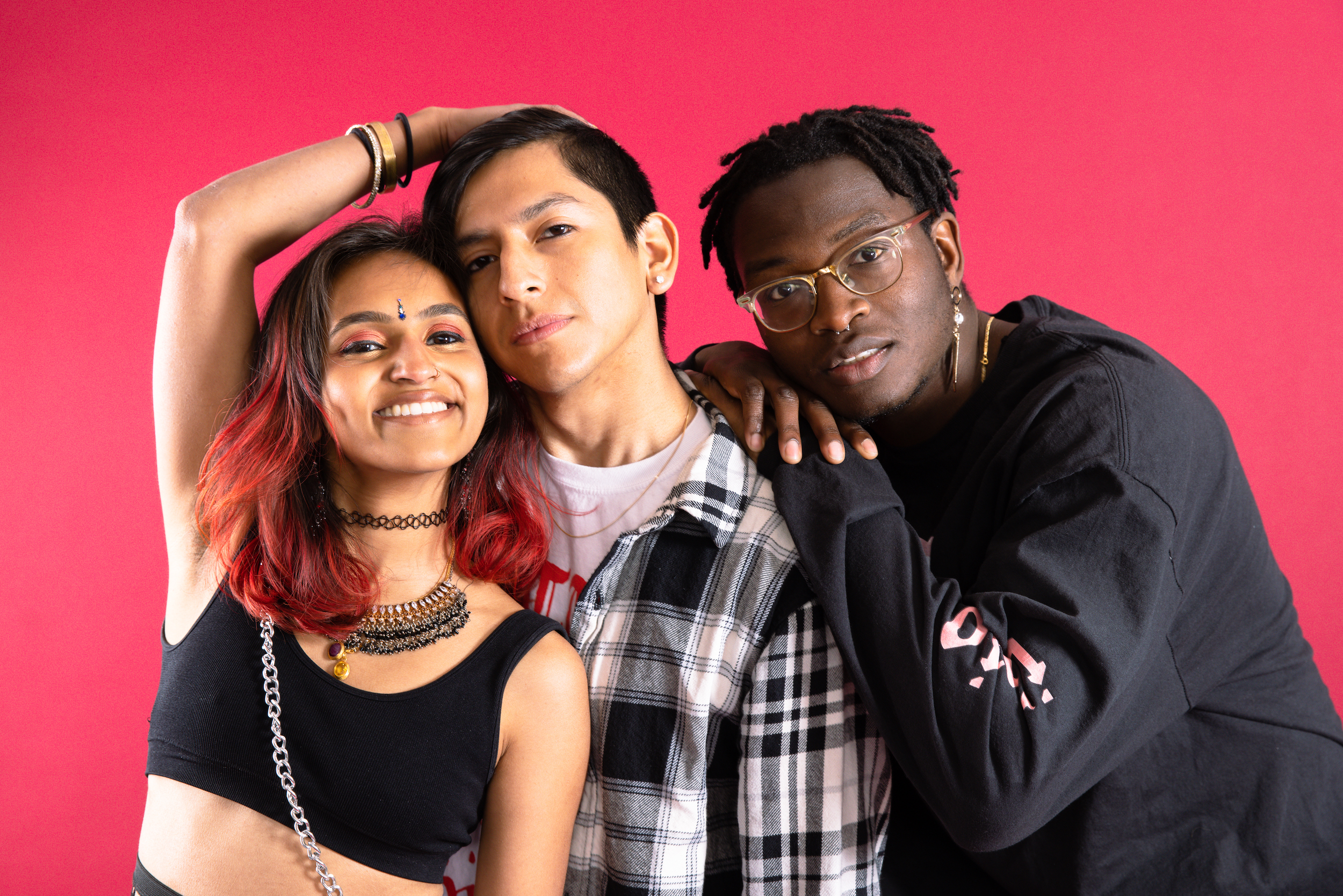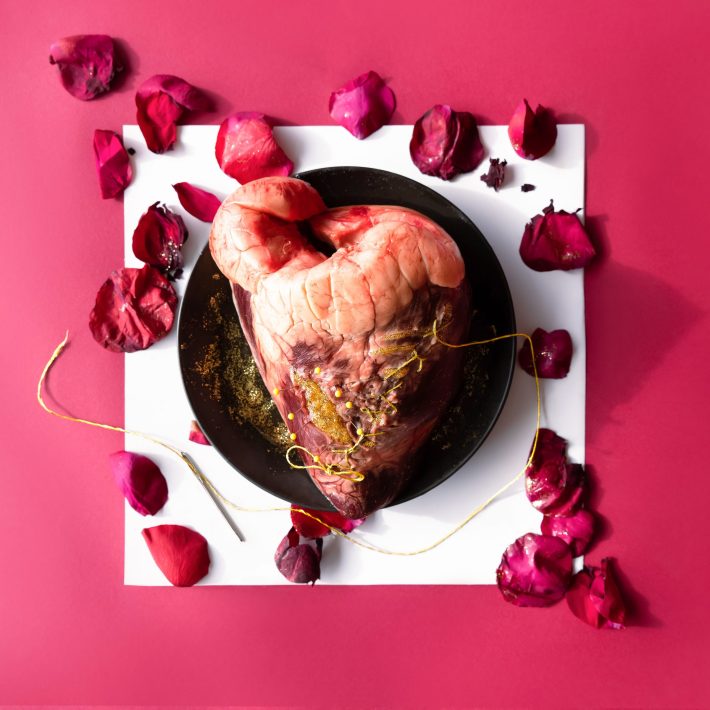The Baltimore upstarts on their fierce, furious, vulnerable debut album Love Me Forever and the new wrinkles in their sound
Once just three Johns Hopkins students with plans to go into medicine or engineering, Pinkshift are now an essential act in modern pop-punk, and they represent a more progressive vision for the genre in several ways. Vocalist Ashrita Kumar, guitarist Paul Vallejo, and drummer Myron Houngbedji rose to fame over the course of the pandemic, most notably with the track "i'm gonna tell my therapist on you." The fact that the band is entirely composed of people of color added some much-needed representation to a pop-punk scene that's historically been predominantly white and male, at a time where audiences were seeking to diversify who they listen to. The 2021 EP Saccharine solidified their stake in the genre.
Debut album Love Me Forever is arriving this Friday via Hopeless Records, a label known for its roster of pop-punk staples including Taking Back Sunday, New Found Glory, and Sum 41. Pinkshift recorded Love Me Forever with producer Will Yip (Turnstile, Mannequin Pussy, the Wonder Years) in Conshohocken, Pennsylvania at Studio 4. Kumar compares Yip's role to that of a coach, saying the experience of recording, "was like summer camp." They tracked the album in three weeks, with just a day to breathe before setting out on a two-month tour with PUP.
Love Me Forever is a confident, surprisingly heavy and angry record – a feeling that Kumar deems vital. "It's such a specific emotion that people generally tend to suppress because they think it's wrong," they said. "But feeling anger sometimes just helps us get through things and get over things and prioritize ourselves." Kumar's lyrics viscerally detail the internal turmoil and emotional experiences they've gone through in the past few years. "It walks you through my brain," Kumar said of their writing style. More specifically, "My brain's been fried, gone to waste with the circumstances/ How much did it cost/ Just to live with all your thoughts?" they sing on album closer "Dreamer" which boasts a triumphant breakdown, signifying the journey of coming to terms with challenges and making it through to the other side.
But Love Me Forever doesn't fit into a particular box. From the sinister thrill of "GET OUT" to the lightning-fast, hardcore-influenced "let me drown" to the gentle piano ballad "in a breath," Love Me Forever makes the band's previous pop-punk tag feel a little too narrow. There's still plenty of pop-punk on the album – the title track, for example – but it's part of a range of influences. Over Zoom, all three members of Pinkshift explained the origins of their debut LP.
When you sat down to make the album, did you have any goals or ideas in mind of what you wanted it to sound like or be about?
PAUL VALLEJO: We all have very different music backgrounds and we all gravitate towards creating different-sounding things. We wanted the album to have a good mix of vibes. Instrumentally, I know Ashrita really likes slower, heavier, grungy stuff… Myron, [I'm] putting words in his mouth maybe, but I know we both really like fast-paced music. When writing the album, we took a step back to really make sure there was a balance between [that] because we wanted a little bit of everybody's preferences on there.
MYRON HOUNGBEDJI: A lot of the songs are reflective of the time period that we were writing them in, both thematically and also instrumentally in terms of what we've been listening to. It's funny listening to the album, and at least for me, listening to specific things that I'm doing on drums and I'm like, wow, that's literally just because I've been practicing these specific songs that I really like. I'm excited to, as I start listening to more stuff and trying out different things, see how they become incorporated into our own songs. It all came together pretty organically and enthusiastically based on what we've been listening to the past year-and-a-half or so.
What were you listening to?
HOUNGBEDJI: [In] the months leading up to our recording session, I was listening to a lot of Kublai Khan, and Turnstile and Knocked Loose. I was actually practicing different songs by them. It's funny because I know if I hadn't been playing those songs, I wouldn't have written what I wrote on the album… So it's cool seeing those kinds of influences come out.
VALLEJO: I was probably listening to a lot of Microwave and Pierce The Veil and Citizen. Especially because during the pandemic, everyone gets emo again… When you cover your favorite artists, and you cover songs, you learn the finger patterns and shapes that they use, and you inadvertently throw those into whatever you're doing. And I definitely notice a lot of that on this album on my end.
ASHRITA KUMAR: I think what was really influential for me was Nirvana. Whenever I write lyrics, I always accidentally write [them] to a Nirvana song that already exists, and then we have to change it [laughs]... Like Nevermind, some In Utero. Also Arctic Monkeys, Favourite Worst Nightmare, that weirdly influenced a lot of lyrics and bridges. I think those were big influences for me, lyrically, and melodically. I guess melodically too, [an influence] was Soundgarden. And tongue-in-cheek-wise, Arctic Monkeys.
You've been lumped under the pop-punk label and I've lumped you under that label too. You're all saying that there's such a varied sound on this album. It's heavier. I can hear the Turnstile influence and the post-hardcore and hardcore influences. I can hear the grunge and '90s alt-rock influence as well. Do you think that this album is going to challenge that perception of you as a pop-punk band?
HOUNGBEDJI: Hopefully.
VALLEJO: I think we definitely wanted that.
KUMAR: We were like, "No more 'Mars!'" [laughs]
VALLEJO: It's not like we don't like being called pop-punk, but we're just like, "Man, it'd be really cool if people added stuff to their list of descriptors for us."
KUMAR: I think one of the things that we were excited about was like, it might not be pop-punk, but it isn't anything else specifically either and being able to take a stab at furthering the genre. I think there's a lot of stuff that isn't even pop-punk anymore in the traditional sense, that's coming up that's being called pop-punk. So being able to join that generation or addition to the genre and try to spread it a little bit… I'm really excited about that.
Going back to the lyrics, like you were saying, I got that tongue-in-cheek aspect, but they're also very easily understandable and accessible. Did you feel like you had a message that you wanted people to get easily?
KUMAR: It's nice to have the lyrics be easily understandable. I feel like I didn't really do that on purpose. The way that I write is very direct. Sometimes I wish I could write more metaphorically because I feel like that shit's cool… Pretty much every song on the record helped me get through something different. Instead of going to therapy, I'll write lyrics. So that's why they're so direct… I don't think there's any song on the record that didn't make me cry. Even "GET OUT," I cried a little… Lyrically, it's what it sounds like when I'm processing things.
You said that you didn't have any ideas or intentions when you started writing, but looking back on the album, now that it's done, do you feel like there's any overarching themes?
KUMAR: The way that these songs came together was over the course of two years... During that time, I was 23 going into what I am now, I'm 25. Going through the pandemic, and stuff like that, I feel like there's a lot of shit that you deal with when you're in isolation and your entire world is flipped. And that happened to everybody. There's a degree of frustration that comes with that at first. It's like, "Damn, why is this happening to me? Me, of all people? Why am I experiencing my twenties in a pandemic? What's going on?" Also, you become more aware of the fact that we're all gonna die [because] of climate change. Everything just feels really hopeless. A lot of the first songs on the album come from that.
Then there's the part when you feel kind of insane and then that all dies down and you're like, "But like, who am I now?" I feel like I'm not even growing. Am I growing? I'm not socially interacting with anyone. I feel like, socially, I'm probably 23 still. I'm probably 22, actually. I'm not doing the things that I was supposed to be doing. My mom wanted me to get married by now and I was supposed to finish and do grad school. There's a lot of internal reflection with that… This is literally what I went through, and [what] I think a lot of people went through, and it kind of follows the progression of the album.
"Trust Fall" was realizing, again, the anger that you feel after going through something that wasn't fair. It's really corny – I mean, I really don't want to say it – but I feel like throughout the whole thing, by the end, after writing all those songs, I feel like I was able to really just love myself a little bit more, in a way that I don't think I really had before the pandemic. I think by the end, you accept that things are out of your control and things change a lot and there's nothing you can do about it. I like the person who I was at the end of all of that. I think that's why the album title was so perfect for that.
I feel like it all comes across in the song "the kids aren't alright." In that song, you cover a lot of ground in terms of all the things that are wrong with the world.
KUMAR: The first couple songs before that are a very vague feeling of feeling exactly what that was… ["i'm not crying you're crying"] is like "I'm really frustrated, but I'm gonna deny that I'm in any pain…" And then in ["cherry (we're all gonna die)"] it's really confusing, because that was also the time when things were going back-and-forth and it was almost a joke. I mean, it's still a joke. But I think "the kids aren't alright" was super focused, compared to those songs. It was very angry and pointed. By that song, we know why all of this is happening. We know why we're frustrated. And it's not our fault. But by the end of the album, regardless of if it's your fault or not, you still have to deal with it, because that's just what life is.
Love Me Forever is out 10/21 on Hopeless.







